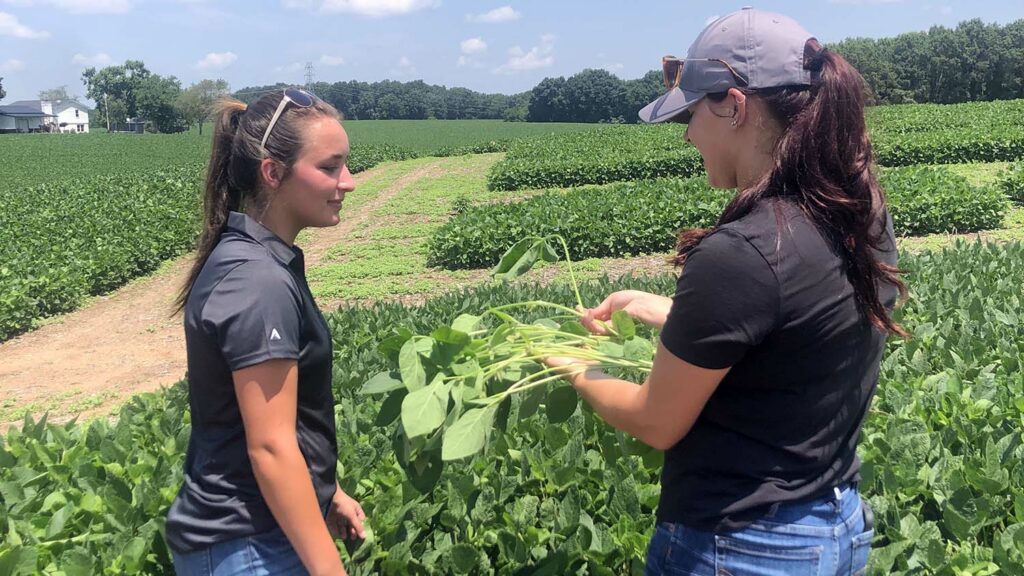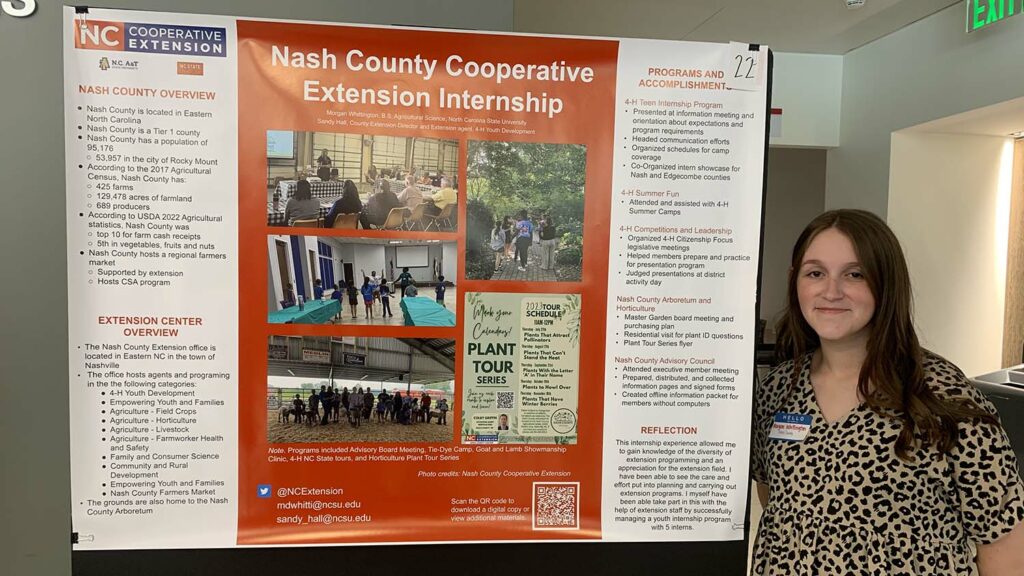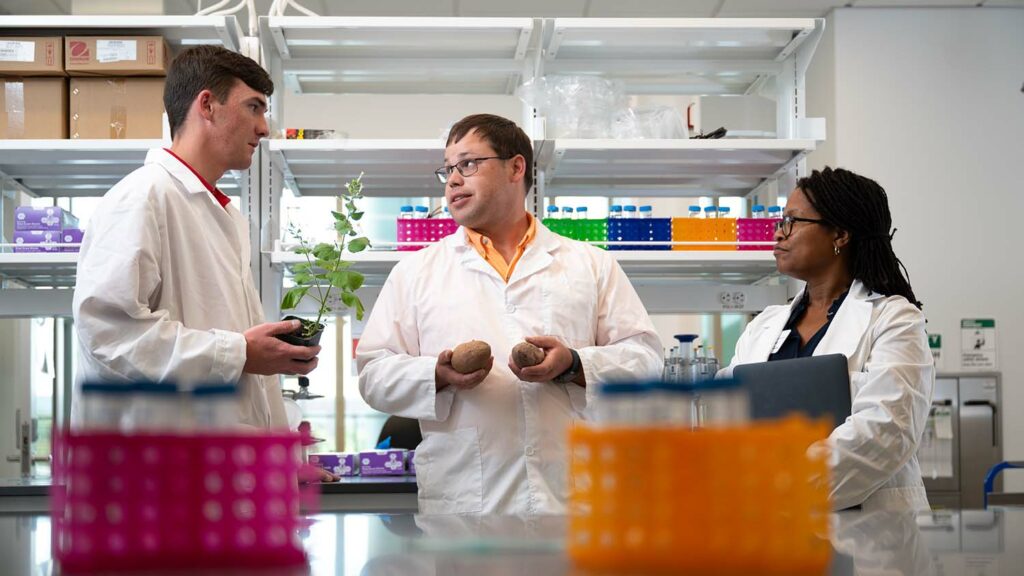Internships Train the Next Generation of Extension Professionals
go.ncsu.edu/readext?958806
en Español / em Português
El inglés es el idioma de control de esta página. En la medida en que haya algún conflicto entre la traducción al inglés y la traducción, el inglés prevalece.
Al hacer clic en el enlace de traducción se activa un servicio de traducción gratuito para convertir la página al español. Al igual que con cualquier traducción por Internet, la conversión no es sensible al contexto y puede que no traduzca el texto en su significado original. NC State Extension no garantiza la exactitud del texto traducido. Por favor, tenga en cuenta que algunas aplicaciones y/o servicios pueden no funcionar como se espera cuando se traducen.
Português
Inglês é o idioma de controle desta página. Na medida que haja algum conflito entre o texto original em Inglês e a tradução, o Inglês prevalece.
Ao clicar no link de tradução, um serviço gratuito de tradução será ativado para converter a página para o Português. Como em qualquer tradução pela internet, a conversão não é sensivel ao contexto e pode não ocorrer a tradução para o significado orginal. O serviço de Extensão da Carolina do Norte (NC State Extension) não garante a exatidão do texto traduzido. Por favor, observe que algumas funções ou serviços podem não funcionar como esperado após a tradução.
English
English is the controlling language of this page. To the extent there is any conflict between the English text and the translation, English controls.
Clicking on the translation link activates a free translation service to convert the page to Spanish. As with any Internet translation, the conversion is not context-sensitive and may not translate the text to its original meaning. NC State Extension does not guarantee the accuracy of the translated text. Please note that some applications and/or services may not function as expected when translated.
Collapse ▲Keely Marlowe returned to NC State University for the fall semester with a new career goal. After graduation, the senior animal science major in the College of Agriculture and Life Sciences would like to be an Extension agent.
“Honestly, I never expected it to be what I wanted to do,” she said. “It wasn’t part of my plan, but now it is. I would really love to go back as a livestock agent or 4-H agent.”
Marlowe became open to the possibility after participating in the Extension Summer Internship Program. She was one of 31 students from NC State and other universities and colleges who spent the summer working at one of Extension’s 101 centers across North Carolina.
“Our aspiration is to get as many young people as possible to understand and get excited about Extension,” NC State Extension Director Rich Bonanno said. “It’s really a great experience because it gives them an opportunity to work with different experts, and to understand a little bit of what the university has to offer to the people of their county.”
Interns serve under a supervisor/mentor, either a County Extension Director or a specialist in one of Extension’s core areas — agriculture and food, health and nutrition, and 4-H youth development. They might spend most of their time in one area, but typically gain knowledge and hands-on understanding of a broad spectrum of programs.
Amy-Lynn Albertson, director of the Extension center in Rowan County, welcomes an intern every summer.
“As a team we really try to let them do a little bit of everything so that they get to see the whole picture of Cooperative Extension,” she said. “We have them do it all. They are out in the field. They’re in the kitchen. They work with youth through 4-H. We keep them really busy. There’s never a boring day for sure.”
This year’s intern was Cassidy Olmedo, an environmental and sustainability major at Catawba College. If she eventually becomes an Extension agent, she will be following a well-trodden path.
“All of the interns that I’ve had have gone on to either get their graduate degrees or to become Extension agents,” Albertson said. “Mackenzie Hall was my intern two years ago and she’s now the livestock agent in Cabarrus County. This year Cassidy has been great.”
Like any topnotch internship, the program allows students to gain real-world experience in a professional setting. The hope is that participants will be open to a career as an Extension expert, or if that was already on their radar they will be even more enthusiastic about the possibility.

Cleveland County field crops agent Heather Schronce passes on knowlege to NC State Extension intern Keely Marlowe.
Marlowe, who spent the summer working at Extension’s Cleveland County Center, fits in the first category. She learned about the opportunity from a fellow student who had interned in Johnston County in 2022.
“I was like, I need to look into that,” she said. “I’ve enjoyed it so much. Everyone who is working as an agent seems to absolutely love it, and the community aspect is just mind blowing. Coming to State really opened my eyes to what Cooperative Extension was, but this internship pushed me to learn more.”
Brynna Laughter, a sophomore majoring in biological and agricultural engineering technology, fits in the latter category. She learned about Extension while attending a career fair at a community college in Henderson County when she was still in high school. She was immediately attracted to the community service aspects.
“Their whole mission is to help people in the community and teach them not just about agriculture, but healthy living and 4-H,” she said. “I thought, ‘I want to help with that. I want to do that.’ It’s just a wonderful program to have across the state. When I applied to State my main goal was to gain knowledge and go back to my hometown and help people there. And Extension is just perfect for that because that’s their whole message.”
Related: Extension Stats and Strengths
Laughter spent the past two summers at the Extension center in Henderson County. She worked primarily with vegetable and small fruit agent Karen Blaedow and horticulture agent Steve Pettis in 2022. This year, she spent most of her time working with 4-H and the Expanded Food and Nutrition Education Program (EFNEP).
“I enjoyed it a lot,” she said. “It was really the staff of our office that made it so wonderful. They’re awesome.”

Morgan Whittington displays a poster that details her experience serving as an NC State Extension intern in Nash County.
As coordinator of the internship program, Joseph Donalson enjoys hearing such testimonies.
“The interns learn all the ins and outs of being an Extension professional, and they develop these competencies that are going to help them in their career,” said Donaldson, undergraduate coordinator for the Extension Education minor in CALS. “Because of Extension’s community engagement, these are competencies they can take with them, regardless of their career pathway.”
Many current Extension professionals are former interns, including Heather Schronce, field crops agent in Cleveland and Lincoln counties. Schronce, who supervised Marlowe this year, was an intern in 2019.
“I feel like it happens with every intern,” she said. “I knew about Extension, but I wasn’t familiar with everything that it had to offer. I learned how involved we are in the community. My internship was based with 4-H, but I got to help out with everything. I knew I wanted to do field crops or something in livestock.”

Clay Beasley (left), an NC State senior majoring in agricultural education, was one of nine Extension interns who spent time working with faculty and scientists at the N.C. Plant Sciences Initiative. Beasley also worked in Wilson County.
An internship was also instrumental in steering the career of Northeast District Extension Director Art Bradley, although his predated the current program. He was an intern in Wilson County in 1990 and in Edgecombe County the following year in what was then the R.J. Reynolds Extension internship.
“I’d grown up in 4-H in Edgecombe and done something with all of the Extension agents in the county office, but after graduating from NC State I was planning to come back and farm with my dad. I didn’t have any intentions of doing anything other than that,” Bradley said. “But going through that first summer, working with everybody there on the staff and really understanding more about what Extension does, it gave me the idea that what I enjoyed doing was helping others. It showed me that it was something I could do as a career.”
He was hired as the ag agent in Edgecombe after graduation, eventually became director of the Extension center, and now has supervisory responsibilities over 22 counties.
“It was the internship experience that really started it all,” he said.
This year, Bradley’s son Jeffrey interned in Edgecombe County.
“I grew up in Extension,” he said. “I had a very large background in it just because my dad was in Edgecombe County for 28 years and I grew up going with him. But I believe I’ve even learned more from this than I did that.”
Related: Clay Beasley Learned About Extension Through an Internship in Wilson County
Jeffrey Bradley, a sophomore majoring in biological and agricultural engineering, was one of nine interns who were partnered with faculty from the university’s N.C. Plant Sciences Initiative.
“I helped with a PSI corn earworm lure study,” he said. “We studied three different trap types with four different lures and we were counting the different effectiveness of moth catching rates to show what the current population of the moth is. That moth currently affects corn, cotton and soybeans, so it’s very prominent.”
His future goals include a career in research or ag engineering, but even if he doesn’t emulate his dad in becoming an Extension agent the internship was still a valuable experience.
“You get to see what Extension does and you can be an advocate for your classmates to experience it or apply for positions,” he said. “It’s a great opportunity to try it out and see if it’s something you’d like.”

